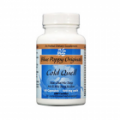Cold Quell
60 capsules x 5000mg. from Blue Poppy Originals
Indications:
Common cold and epidemic influenza with possible bronchitis and especially in women, and even more especially perimenstrually. However, if the patient’s pattern conforms, this formula may be taken by men and women alike and regardless of phase in menstrual cycle. For instance, this formula is also often indicated for postpartum fevers and flus and for the recurrent fevers, sore throats, and swollen glands of people with chronic fatigue syndrome (CFS).
Applications in Traditional Chinese Medicine:
Pattern: wind heat external invasion exterior pattern in a person with a righteous qi vacuity and liver depression qi stagnation. There may also be phlegm nodulation and/or heat toxins.
Classical antecedent: Xiao Chai Hu Tang, He Si Wu Tang Jia Jian
The symptoms of wind heat external invasion exterior pattern are primarily:
sore throat
fever with light sweating
a floating, rapid pulse
If there is a shao yang pattern, there will be:
alternating fever and chills
a bowstring or wiry pulse
lack of appetite
half of the tongue fur may be yellow with or yellow fur may encircle white
cough
Phlegm nodulation is evidenced by:
swollen, painful glands
Heat toxins are evidenced by:
more pronounced sore throat
possible purulence of the tonsillar membranes
higher fever
Righteous qi vacuity in this case means both a qi and blood vacuity.
Qi vacuity means primarily spleen qi vacuity evidenced by:
fatigue
lack of appetite
lack of strength in the four limbs
a tendency towards loose stools
Blood vacuity is evidenced by a fine, bowstring or wiry pulse.
Liver depression qi stagnation is evidenced by:
abdominal or breast distention and pain
irritability
a bowstring pulse
If this depression has transformed into heat, there may be:
red, painful eyes
a red tongue with swollen rims and yellow fur
a bowstring, rapid pulse
Formula explanation
Bupleurum, Forsythia, Lonicera, and Arctium all resolve the exterior and clear heat. Lonicera, Forsythia, Arctium, Scrophularia, and Isatis clear heat and resolve toxins. Arctium, Scrophularia, and Platycodon disinhibit the throat. Bupleurum also courses the liver and rectifies the qi. Pinellia and Platycodon transform phlegm, while Scrophularia scatters nodulation. Uncooked Ginger primarily helps Pinellia and Platycodon transform phlegm and eliminate dampness, but also does harmonize and open the stomach, thus helping to restore the appetite. Scutelleria clears heat especially from the lungs, stomach, and liver-gallbladder. Uncooked Rehmannia clears heat and cools the blood, engenders fluids and enriches yin. Combined with Dang Gui and Peony, these ingredients prevent evil heat from damaging yin blood. They also harmonize both the constructive and defensive and the liver. Ligusticum Wallichium moves the qi within the blood and also acts as a messenger, leading the other medicinals upward. Thus Ligusticum Wallichium relieves head and throat pain by quickening the blood. Codonopsis, mix-fried Licorice, and Red Dates all fortify the spleen and supplement the qi, thus supporting the righteous. Further, Licorice, Red Dates, and Ginger harmonize all the other ingredients in the formula, thus protecting the stomach qi.
Premenstrually, the blood in women collects in the uterus. The blood is the mother of the qi. Therefore, this may A) leave the defensive and constructive unharmonized, allowing easy invasion by external evils, and B) may leave the liver undernourished. Blood must nourish the liver in order for the liver to do its duty of controlling coursing and discharge. This means that a liver blood vacuity may cause or aggravate liver depression qi stagnation. If the liver becomes depressed, the spleen becomes vacuous. A vacuous spleen cannot move and transform body fluids normally which, therefore, gather and collect and may transform into phlegm. A vacuous spleen cannot engender and transform the qi and blood, including the defensive qi. If liver depression worsens or endures, it may transform into depressive heat. Heat by its nature rises to collect in the florid canopy above, i.e., the lungs. Therefore, the lungs often harbor deep-lying or hidden heat due to liver depression transforming heat below. If external evils invade because of a defensive qi vacuity in turn due to a spleen vacuity, these external evils hinder the lungs’ dispersion and downbearing. Thus body fluids gather and collect, transforming into phlegm, remembering that the lungs are the upper source of water. Then this dampness and phlegm may hinder and obstruct the free flow of qi all the more. In addition, external heat evils may mutually inflame depressive heat in the lungs, stomach, and liver. In other words, wind heat evils may mutually engender depressive heat already harbored in the body or make the transformation of depression into heat all the more likely. When depressive heat is engendered internally, it tends to move outward and upward.
Ingredients:
Ban Lan Gen (Radix Isatidis/Baphicacanthi)
Lian Qiao (Fructus Forsythiae)
Jin Yin Hua (Flos Lonicerae)
Xuan Shen (Radix Scrophulariae)
Sheng Di (uncooked Radix Rehmanniae)
Chuan Xiong (Rhizoma Chuanxiong)
Huang Qin (Radix Scutellariae)
Chai Hu (Radix Bupleuri)
Dang Shen (Radix Codonopsitis)
Ban Xia (Rhizoma Pinelliae)
Da Zao (Fructus Jujubae)
Sheng Jiang (uncooked Rhizoma Zingiberis)
Niu Bang Zi (Fructus Arctii)
Bai Shao (Radix Paeoniae Albae)
Dang Gui (Radix Angelicae Sinensis)
mix-fried Gan Cao (Radix Glycyrrhizae)
Jie Geng (Radix Platycodi)
Dosage:
2 capsules 2 times a day
Package:
60 capsules x 5000mg. (500mg. x 10:1 concentration ratio)
Note: All Blue Poppy brand products come with the manufacturing date marked (MFG or Manuf. Date), the expiration date is 5 years from the date indicated on the bottom or side of the packaging.

